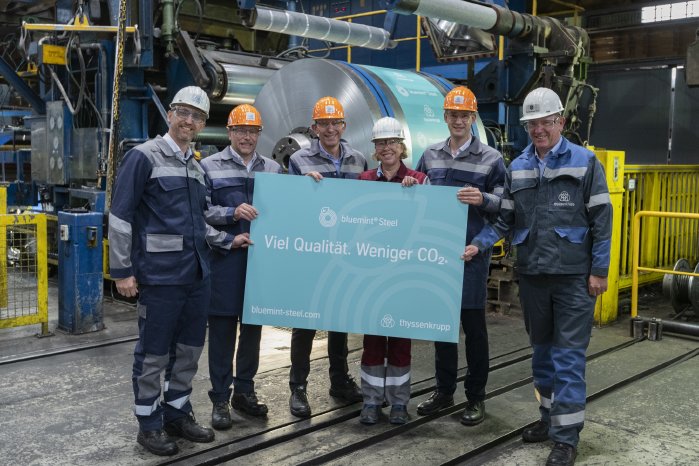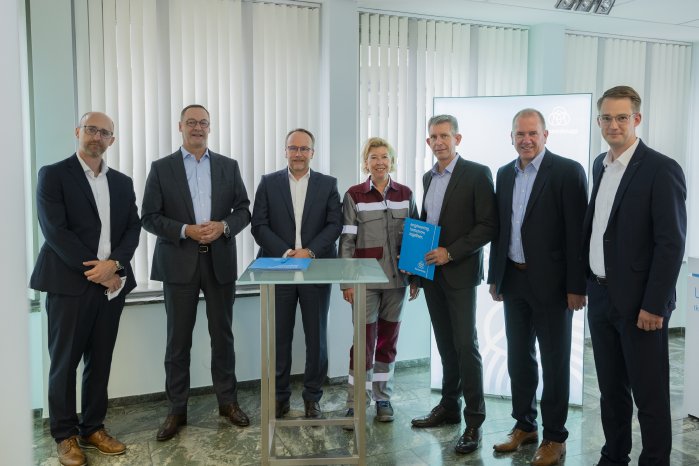- thyssenkrupp Steel Europe has agreed with the automotive supplier Mubea to supply CO2-reduced steel (bluemint® Steel) as from the commissioning of the direct reduction plant in 2026.
- Increasing, significant purchase volumes are planned through 2030.
- For thyssenkrupp Steel, the official memorandum of understanding marks the successful start to the marketing of CO2-reduced steel from the direct reduction plant.
- CO2-reduced steel supports Mubea's ambitious sustainability goals.
Low CO2 steel for vehicle components
Starting from the commissioning of the direct reduction plant, scheduled for 2026, thyssenkrupp Steel will supply the world market leader in the production of innovative and efficient lightweight components with climate-friendly bluemint® Steel. In the years up to 2030, the volumes purchased are planned to increase step by step. thyssenkrupp already offers its customers CO2-reduced and certified steels on the basis of its tkH2Steel transformation concept. To this end, various opportunities for CO2 reduction are being exploited within the existing technology framework. Thus, Mubea is already relying on bluemint® recycled even before the direct reduction plant starts operation. For this CO2-reduced flat steel, a high-quality recycled steel product is used in the blast furnace. This new technological approach reduces the use of coal in the blast furnace. For the input volume of the recycled steel product, absolute CO2 emissions are reduced by 64 percent compared with the conventional blast furnace process.
Long-standing partnership with Mubea
The memorandum of understanding between thyssenkrupp Steel and Mubea strengthens the long-standing partnership between the two companies, and now lays the foundation for long-term supply relationships involving CO2-reduced steel as well. With their commitment to climate-friendly steel production, thyssenkrupp Steel and Mubea are pursuing the same goal: the transformation to sustainability and climate protection.
The memorandum of understanding signed with thyssenkrupp Steel is a cornerstone of Mubea's ambitious climate strategy. Mubea aims to be climate-neutral as early as 2035 and to reduce the total CO2 emissions of its business activities by at least 25 percent as early as 2025. However, as the majority of CO2 emissions from Mubea products come from the up-stream chain, the company is discussing with suppliers such as thyssenkrupp what reductions in specific CO2 emissions can be achieved within the planned timeframe. On a plant tour of the main sites of future low-CO2 production, the Mubea Executive Board saw for themselves the planned scope of the transformation at thyssenkrupp Steel Europe in Duis-burg. Because to achieve the climate targets in the industry, it is crucial to consider the emissions of the entire supply chain. The CO2-reduced steel from thyssenkrupp Steel will make an important contribution to this in the future.
About Mubea
Mubea is an owner-managed family business based in Attendorn, Westphalia, Germany, with more than 14,000 employees spread across 44 locations in 20 countries. The top automotive supplier not only develops products for chassis, body and the powertrain, but is also active in the aviation, industry and micromobility sectors. With its core competence - the development and production of best-in-class lightweight construction solutions - the Mubea Group of Companies contributes significantly to the success of conventional and electrified vehicles. The company, with annual sales of 2.8 billion euros, is the world market leader for lightweight spring components.



